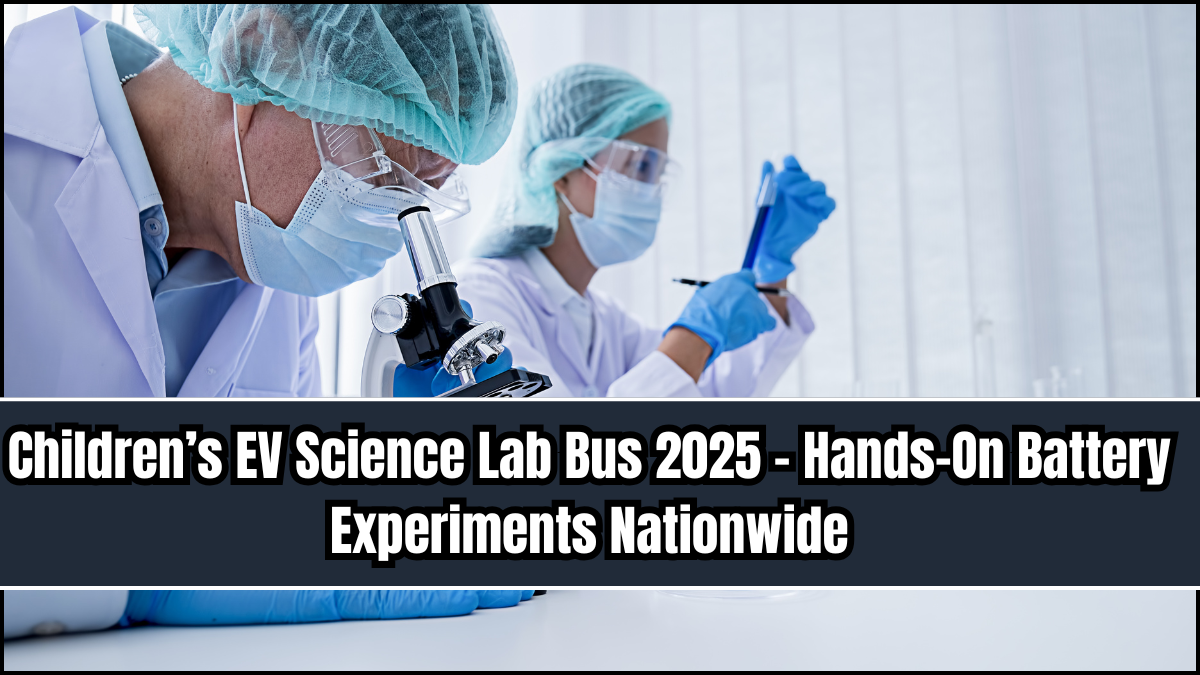In 2025, India is taking science education directly to the streets with the launch of the EV Science Lab Bus 2025. This unique nationwide initiative is designed to spark curiosity among children by giving them hands-on experience with electric vehicle (EV) technology and battery science.
The project transforms regular buses into mobile science labs, traveling to schools, villages, and towns to teach students about clean energy, EV batteries, and the future of sustainable mobility. With India pushing hard towards an electric future, the EV Science Lab Bus ensures that the next generation is both aware and prepared to lead the change.

The Concept of the EV Science Lab Bus
The initiative involves custom-designed buses equipped with science kits, interactive models, and mini-labs. These buses visit schools across the country, turning playgrounds and courtyards into exciting learning hubs.
Children get the chance to:
-
Build mini battery packs from safe materials.
-
Learn how EV charging works through interactive models.
-
Experiment with solar-powered toys and circuits.
-
Understand the basics of electric motors and propulsion.
-
Explore concepts of renewable energy and sustainability.
By moving beyond textbooks, the lab buses make science tangible and engaging.
Why It Matters
The EV Science Lab Bus 2025 is more than just an educational initiative—it’s a movement. India faces a huge challenge in building awareness of clean mobility, especially in rural areas where exposure to EVs is limited. By targeting children, the program plants seeds of awareness early, ensuring that future citizens are ready for a green mobility revolution.
Additionally, this project helps:
-
Bridge the education gap between urban and rural students.
-
Encourage STEM learning in schools with limited infrastructure.
-
Promote sustainability, aligning with India’s Net Zero vision.
Inside the Lab Bus
Each bus is fitted with advanced but child-friendly equipment. Some key features include:
-
Interactive display panels showing EV components like motors, batteries, and controllers.
-
Mini charging stations powered by solar panels on the bus roof.
-
Experiment stations where students can build circuits and test renewable models.
-
Virtual reality modules that simulate driving an EV.
-
Science facilitators trained to guide children in simple, fun experiments.
The interiors are designed to feel more like a science playground than a classroom, with colorful walls, posters, and movable kits.
Nationwide Reach
The EV Science Lab Bus 2025 will travel across both urban centers and remote villages. The plan includes:
-
Covering 20,000+ schools within the first year.
-
Special focus on Tier-2 and Tier-3 towns, where awareness of EVs is lower.
-
Multilingual content, ensuring that children learn in their local languages.
By making the initiative accessible nationwide, the project ensures inclusivity and equal opportunities for children across India.
Building Future Innovators
The ultimate goal of the program is to inspire the next generation of scientists, engineers, and innovators. By giving children hands-on exposure to EV technology, the project encourages them to think creatively about solutions for future mobility challenges.
For example, a child experimenting with solar-powered models today could become tomorrow’s EV battery scientist or renewable energy entrepreneur.
Collaboration and Support
The EV Science Lab Bus is supported by a partnership between:
-
Government education departments ensuring access to schools.
-
Automobile companies providing EV components for learning kits.
-
Renewable energy firms contributing solar panels and models.
-
NGOs and foundations funding outreach in underserved areas.
This collaborative model ensures both sustainability and scalability, making the initiative more than just a one-time project.
Tourism and Public Engagement
Beyond schools, the buses are also being showcased at science fairs, auto expos, and public events. Parents, teachers, and communities can join in, making the project a larger public awareness campaign for EVs.
Families get to explore EV models, test out charging demos, and engage in discussions about eco-friendly lifestyles.
Looking Ahead
The EV Science Lab Bus 2025 is expected to be the first phase of a larger program. Future plans include:
-
AI-powered teaching assistants inside the buses for interactive lessons.
-
Dedicated STEM labs in rural schools, seeded by the mobile labs.
-
International collaborations, bringing global EV science kits to India.
-
Expanded subjects, covering hydrogen fuel cells and other green technologies.
Final Thoughts
The EV Science Lab Bus 2025 is more than just a science project—it’s a mission to educate, inspire, and empower. By making battery science and clean energy fun for children, India is creating a foundation for a sustainable future.
For kids, it’s an adventure on wheels. For teachers, it’s a new way to ignite curiosity. And for the nation, it’s a powerful step toward building a generation ready to drive the electric revolution.
FAQs
What is the EV Science Lab Bus 2025?
It is a mobile science lab initiative where buses are transformed into classrooms, teaching children about EV batteries, renewable energy, and sustainability.
Who benefits from this program?
Schoolchildren across India, especially in rural and Tier-2/3 towns, benefit from hands-on science learning experiences.
What experiments do children perform?
They build mini battery packs, test solar-powered toys, learn EV charging basics, and explore electric motors.
How is the project powered?
The buses are fitted with solar panels, ensuring eco-friendly operation and renewable-powered experiments.
Is the program available nationwide?
Yes, the buses are scheduled to cover 20,000+ schools in both urban and rural India in 2025.
Who supports the initiative?
The program is a collaboration between government departments, automobile companies, renewable energy firms, and NGOs.
Will the program expand further?
Yes, future plans include AI-powered learning, permanent STEM labs in rural schools, and modules on hydrogen and other clean tech.
Click here to know more.
